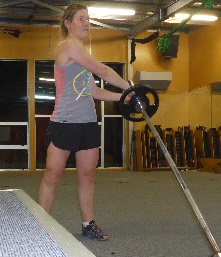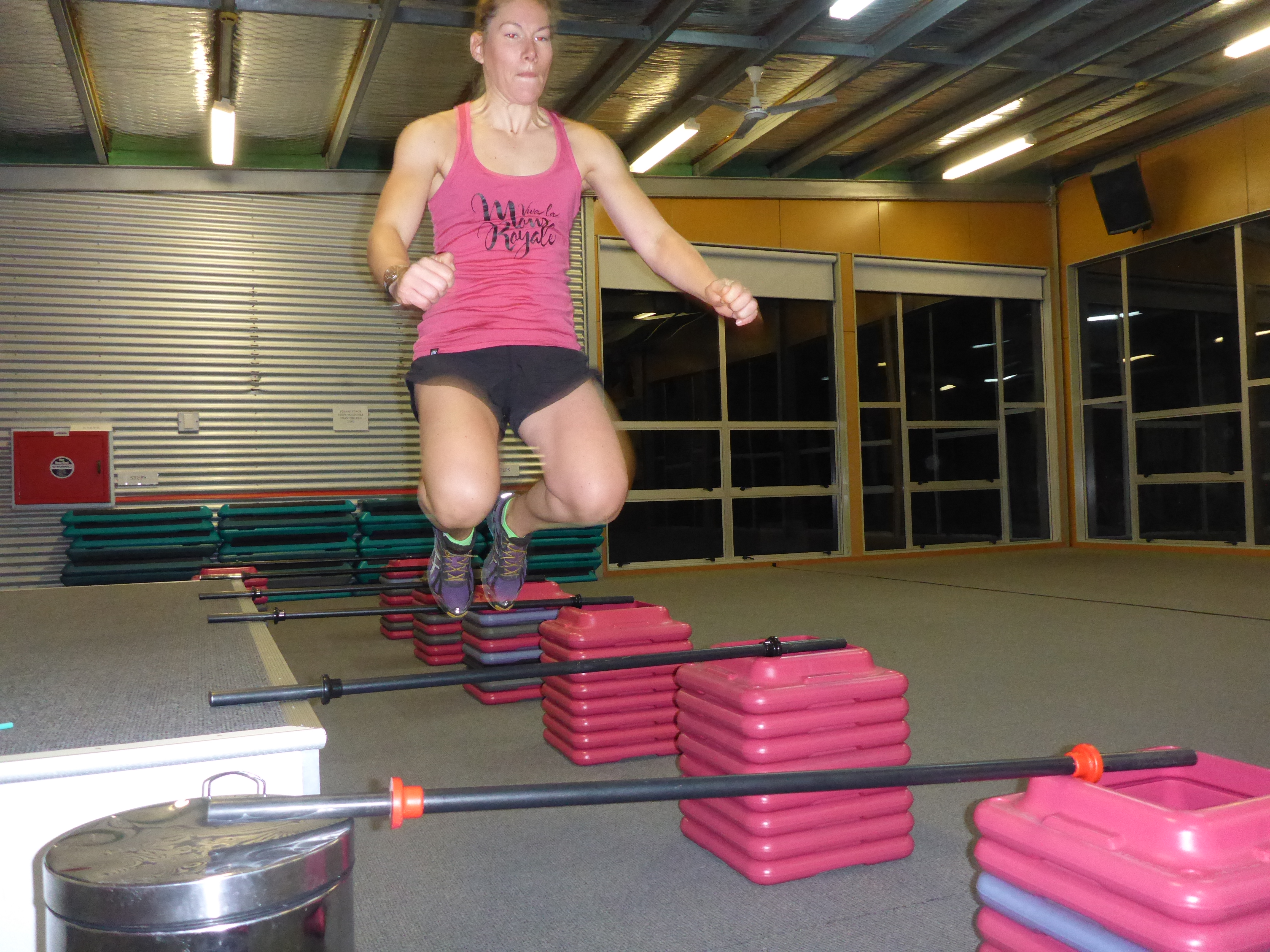By Marian Krogh
Freeskiing, Big Mountain Skiing, Freeriding, Extreme Skiing, whatever you want to call it is a unique sport. There is typically no training, no coaching, no teams. Most athletes in this sport train on their own in their own way, and I am no exception. For the past 2 months I’ve been following the Mountain Athlete freeski training program on my own.
I didn’t grow up skiing, but I always loved it and so when I started university I joined the ski club and tried to go on as many weekend trips as I could. After about 20 days on snow I began working as a ski instructor in my holidays. I started out at the bottom of the heap teaching 3 & 4 year olds how to ski – I wasn’t even allowed to teach off of the magic carpet until I improved my skiing. From there I trained as much as I could with other instructors and trainers and over the years I have moved up the Ski Instructor ladder but continue to train. There is always room for improvement, I will never stop learning and training, every run I ski I have some sort of focus.
I’m now a professional skier, it’s my job to ski and therefore my job to train too. I’m serious about my sport and career and it starts when I head to the gym every morning. I need to be strong, have endurance and power as well as be mentally fit and confident. My most important piece of equipment is my body. If I’m not strong it doesn’t matter what kind of skis or boots I have – I believe that a good skier can ski well on any type of ski. There is a lot of risk in Big Mountain skiing so I’m trying to minimize the risk by making my body as strong as possible. Mountains are strong and could really hurt me if I’m not fit. This winter season in New Zealand I am prioritizing my fitness. I’m missing out on sleep, social activities and even skiing in order to make it to the gym every day.
My main sport at university was rowing, I trained 6 mornings and 5 evenings a week every week – that amount of hard work was necessary to do well in the sport. I’m now transferring that dedicated work ethic I developed from rowing across to freeskiing. Freeskiing is becoming more and more of an elite sport and to just train by skiing isn’t going to cut it anymore. It hasn’t been traditional for freeskiers to train in the gym but Rob Shaul and his team at Mountain Athlete have changed this. They’ve seen the popularity of freeskiing in Jackson Hole surge and have created a specific training program for freeski athletes living in Jackson over the summer.
The Freeski program follows cycles based on strength, agility, power and endurance. Rob creates unique workouts to address what he believes freeskiers need most; a strong “mountain chassis” – the legs and core. The athletes living in Jackson get to go to the Mountain Athlete gym, get training, coaching and to be part of a team (The Monster Factory). They get to have someone watching them, giving them tips on their technique. They get to have coaches who set up all the equipment like hurdles for them. They get to have the positive encouragement of their team members cheering them on and the get the competitive edge by always trying to lift more, run faster, hold longer than the other athletes next to them.
I used to feel that because of that the athletes in Jackson (my competitors) had an advantage. I wished that I was there, training with them, surely I would be lifting more if I was lifting right next to another athlete doing the same exercise? This season I’ve been following the Mountain Athlete Freeski workouts from a distance, trying my best to replicate them in my local gym in Wanaka, New Zealand and lately I’ve been thinking more that this individual training is giving me an advantage.
I’m now taking a positive approach to training solo. I train alone partly because there are no other skiers here who will wake up early to go to the gym,it’s just too hard for them. I’d like to train with other freeskiers who are serious, and professional, I’d like to develop more of a training culture here but in reality, right now nobody else is interested. To have some training buddies would be fun I’ve decided it’s not necessary. When I’m in the start gate of a comp I’m all by myself, it’s just me and the mountain so I think it should be the same for my training. Nobody can push me harder than I can push myself. It’s both a mental workout and a physical workout to challenge myself at the gym and on the hill. .
 Being strong can mean a whole bunch of things. It could mean doing a really heavy squat but surely you are stronger if you can do that squat all by yourself? Training solo is making me stronger every day. Currently what I’m personally working on is my speed and anaerobic capacity with sprints and agility drills that I find really difficult to do on my own. On the opposite side of the spectrum are the 15 or 20 min grinds with 3 or 4 exercises repeated continuously and where I don’t allow myself to stop. It’s the same as skiing a long face in a comp – there’s no time for water breaks. I’m not not stopping because there is a coach standing next to me, or I can see other athletes pushing on, It’s only me not letting myself rest.
Being strong can mean a whole bunch of things. It could mean doing a really heavy squat but surely you are stronger if you can do that squat all by yourself? Training solo is making me stronger every day. Currently what I’m personally working on is my speed and anaerobic capacity with sprints and agility drills that I find really difficult to do on my own. On the opposite side of the spectrum are the 15 or 20 min grinds with 3 or 4 exercises repeated continuously and where I don’t allow myself to stop. It’s the same as skiing a long face in a comp – there’s no time for water breaks. I’m not not stopping because there is a coach standing next to me, or I can see other athletes pushing on, It’s only me not letting myself rest.
When I go to the gym every morning and wake up to my alarm at 5.15am, nobody else will know if I’m there or not, no coach will phone me to see where I am. When I’m at the gym it’s me that sets up the hurdles (it takes a really long time stacking aerobics blocks), It’s me that tests and determines my own 1RM and it’s me that asks other gym members to clear the floor so I can do my walking lunges. I used to be too embarrassed to do some exercises but now I’ve definitely gotten used to people giving me strange looks when I do strange exercises. I determine what my own 1RM is, and it’s me analyzing my own technique in the mirror with almost every exercise. I am my own coach, team and competitor. I’m confident that with all my hard work and the great Mountain Athlete training plan I am going to have a successful competitive season. I’m in New Zealand skiing now, and training 5 days a week, preparing for the 2016 winter. My goal for this season is to place in the top 10 female skiers in North America.
You Might Also Like MTI’s Backcountry Ski PreseasonTraining Plan

